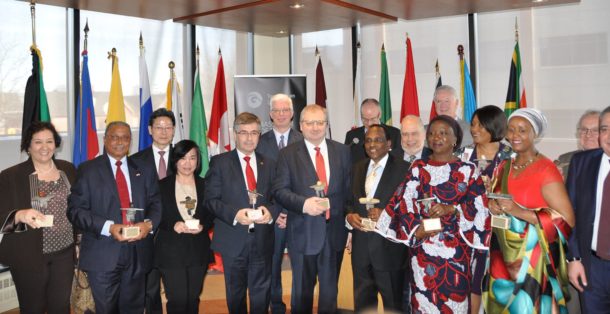Authors: eng.lsm.lv (Latvian Public Broadcasting) image from article
image from article
On 27 November at the library of the University of Latvia, the State Secretary of the Ministry of Foreign Affairs, Andris Pelšs, unveiled an exhibition titled “Latvia–Greece Relations 1918–2018” devoted to the history of political, economic and cultural contacts between the Republic of Latvia and the Hellenic Republic.
The exhibition looks back at the timeline of the relationship between Latvia and Greece since the opening of the Hellenic Vice-Consulate in Riga in 1895, the establishment of diplomatic relations in 1922 after the Republic of Latvia had been proclaimed, and through to the present-day cooperation in politics, economy and culture. The fact that Greece did not recognize Latvia’s occupation and annexation by the Soviet Union after 1940 has been highlighted in particular.
The Director of the Diplomatic Archives and Documents Department at the Hellenic Ministry of Foreign Affairs, Photini Tomai-Constantopoulou, delivered an address reflecting on the Latvian-Greek bilateral relations from a historical perspective, with the focus on the activities of the Latvian honorary consuls in the inter-war period and the position of Greece during the time Latvia was under occupation.
The exhibition project is part of the Foreign Ministry’s Public Diplomacy [JB emphasis] Program for the Centenary of the Latvian State.
The idea was conceived by the Latvian Ambassador to Greece, Māris Klišāns, and the Ambassador of the Hellenic Republic to Latvia, Alexandros Rallis.
"The exhibition is a significant contribution to the exploration the history of bilateral relations and promotion of mutual communication, as research in the historical archives of both countries has yielded much valuable information," the Ministry of Foreign Affairs said.
The exhibition Latvia–Greece Relations 1918-2018 is open for the public from 28 November to 12 December in the Library of the University of Latvia in Riga, at Kalpaka Bulvāris 4. In January next year, the exhibition will travel to Athens.
Original Article
New exhibition examines Latvia-Greece relations
Views: 2












